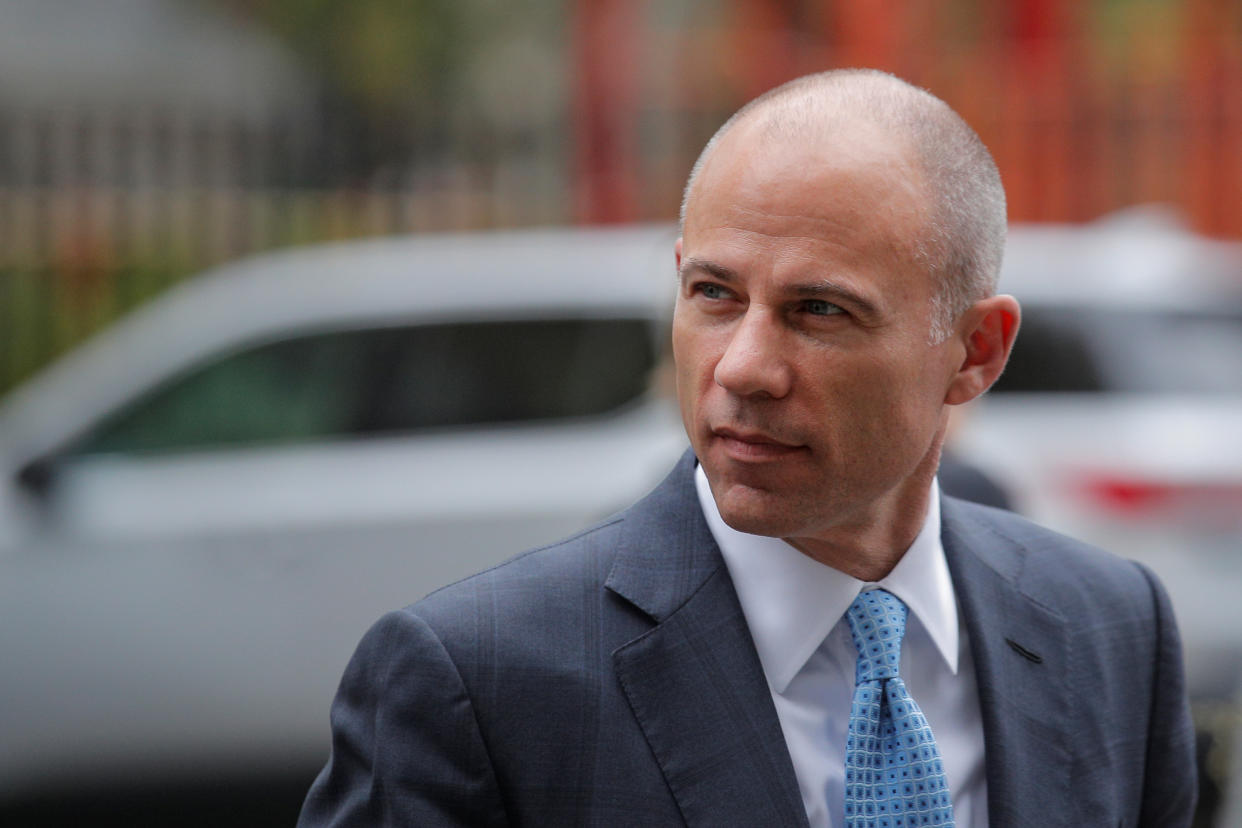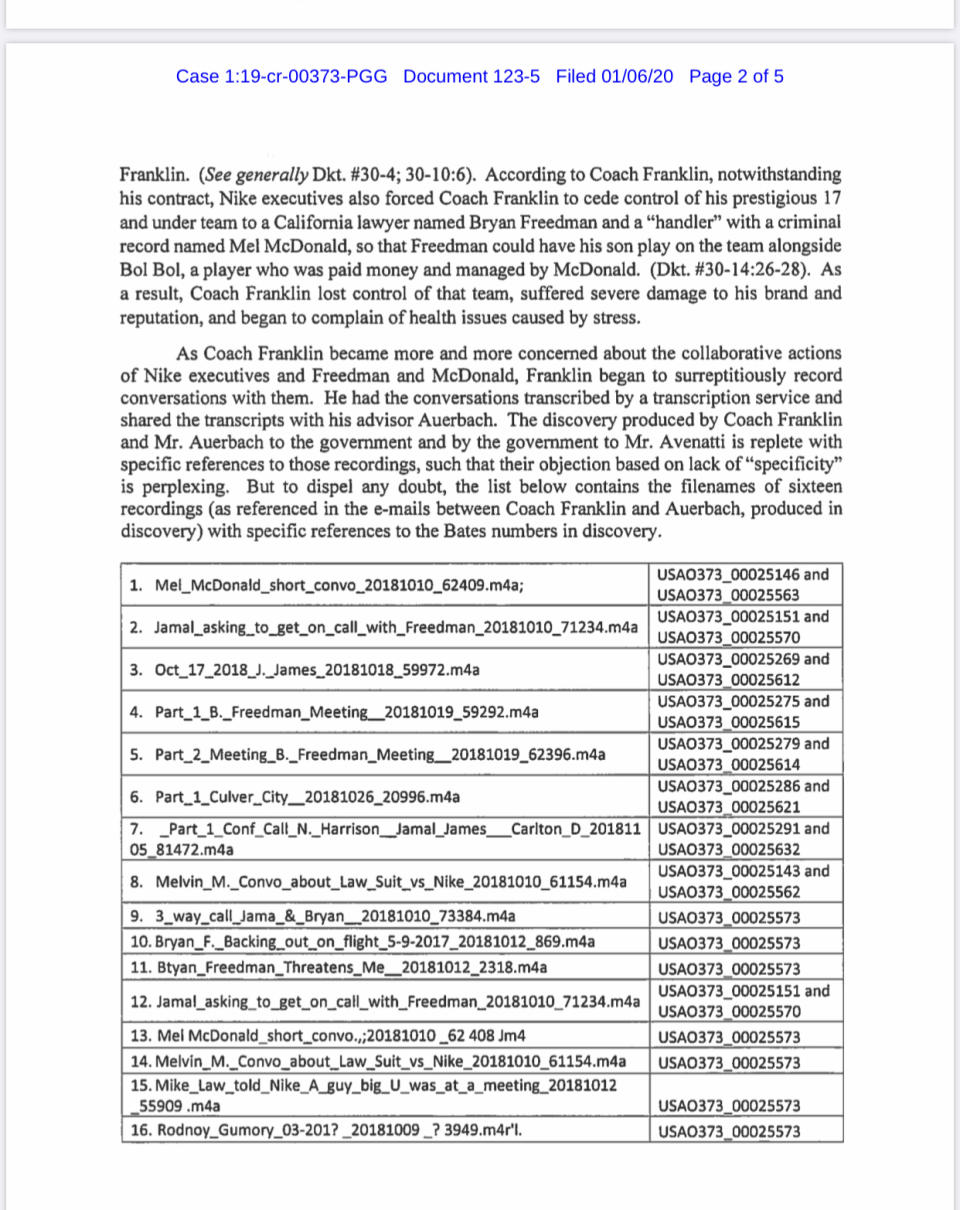Court filings in Avenatti trial show existence of secretly recorded Nike executive conversations

Court filings Monday in the upcoming extortion trial of famed attorney Michael Avenatti revealed that Avenatti’s one-time client, AAU coach Gary Franklin, secretly recorded numerous conversations with high-level Nike Basketball executives.
Avenatti is scheduled to stand trial Jan. 21 in the Southern District of New York. He is charged with trying to “shake down” Nike by threatening to reveal its grassroots basketball department had allegedly funneled money to top high school prospects and their families/handlers. This is a manner similar to what caused an executive and consultant at rival Adidas to be convicted of fraud in 2018.
Avenatti counters he was representing a whistleblower, Franklin, who had lost his California-based travel team in part for not cooperating. Rather than extorting Nike, Avenatti contends he was negotiating a settlement for his then-client and offering to conduct an extensive independent investigation into the conduct of the Elite Youth Basketball League (EYBL) for Nike.
Avenatti, in a quest to show as much potential criminal behavior as possible at Nike, wants the recordings and transcripts of the recordings to be available for the trial, if not made public prior to it. The government and Franklin have sought to keep them under seal.
Franklin, according to the filings, began to record Nike executives when he became uncomfortable with requests about how he should operate his longstanding travel team based out of Southern California.
“As Coach Franklin became more and more concerned about the collaborative actions of Nike executives and [Bryan] Freedman and [Mel] McDonald, Franklin began to surreptitiously record conversations with them,” Avenatti’s filing reads.
The Nike executives that were recorded, according to the filing, include Jamal James, Nico Harrison and Carlton DeBose. They are all major players in the company’s Elite Youth Basketball division (EYBL), which oversees high-level travel and high school teams as well as talent camps and tournaments. They are among the most powerful and plugged-in figures in amateur basketball.
Freedman is identified in the filing as Bryan Freedman, a “California lawyer,” and McDonald is Mel McDonald, a “handler” who ended up tied to top prospects Deandre Ayton and Bol Bol.
The filing contains a list of 16 specific calls that were recorded. Avenatti is also seeking any additional recordings involving Franklin and Nike officials, including those concerning “the payment to amateur basketball players and/or their families or agents between January 1, 2016 and March 25, 2019.”
The details of the recordings are currently unknown. However, an email between Franklin and Jeffrey Auerbach, who is described as Franklin’s “advisor/consultant,” contains passages where Auerbach summarizes one of the recordings.
“Gary listende [sic] to the tape. This guy is something else,” the email from Auerbach reads, not identifying who the “guy” is. “He and Carlton come into your house, your program, which you’ve been running long before they ever got to Nike, and give you a directive you can’t refuse (so why even ask?) and inject criminal elements and behavior …”
The tapes could open a window into the world of grassroots basketball and the recruitment of top players by shoe companies, agents and college programs.
The federal government initially got involved in this part of the sports world when the FBI conducted a three-year investigation (that centered mostly on Adidas) and prosecutors at the SDNY vowed to clean up the sport. Two trials, in 2018 and 2019, resulted in some low-level convictions and plea deals, plus a handful of high-profile college programs likely facing NCAA infractions cases.
The once-promised impact of the scandal has been limited, however, by the government curbing available information and the scope of the trials. That includes numerous FBI-taped conversations featuring prominent NCAA coaches, which would be coveted by NCAA investigators, that remain under court-order seal.
Because the initial trials stemming from the FBI investigation centered on the conduct of Adidas, it was schools sponsored by that shoe company — including Louisville, Kansas and North Carolina State — that found themselves in trouble. Nike has mostly avoided the spotlight, despite being the industry leader that sponsors powerhouses North Carolina, Duke and Kentucky.
U.S. District Judge Paul Gardephe will make the decision on whether these recordings become public or can be used in court. The ruling is expected before Avenatti’s trail.

More from Yahoo Sports:

 Yahoo Lifestyle
Yahoo Lifestyle 
